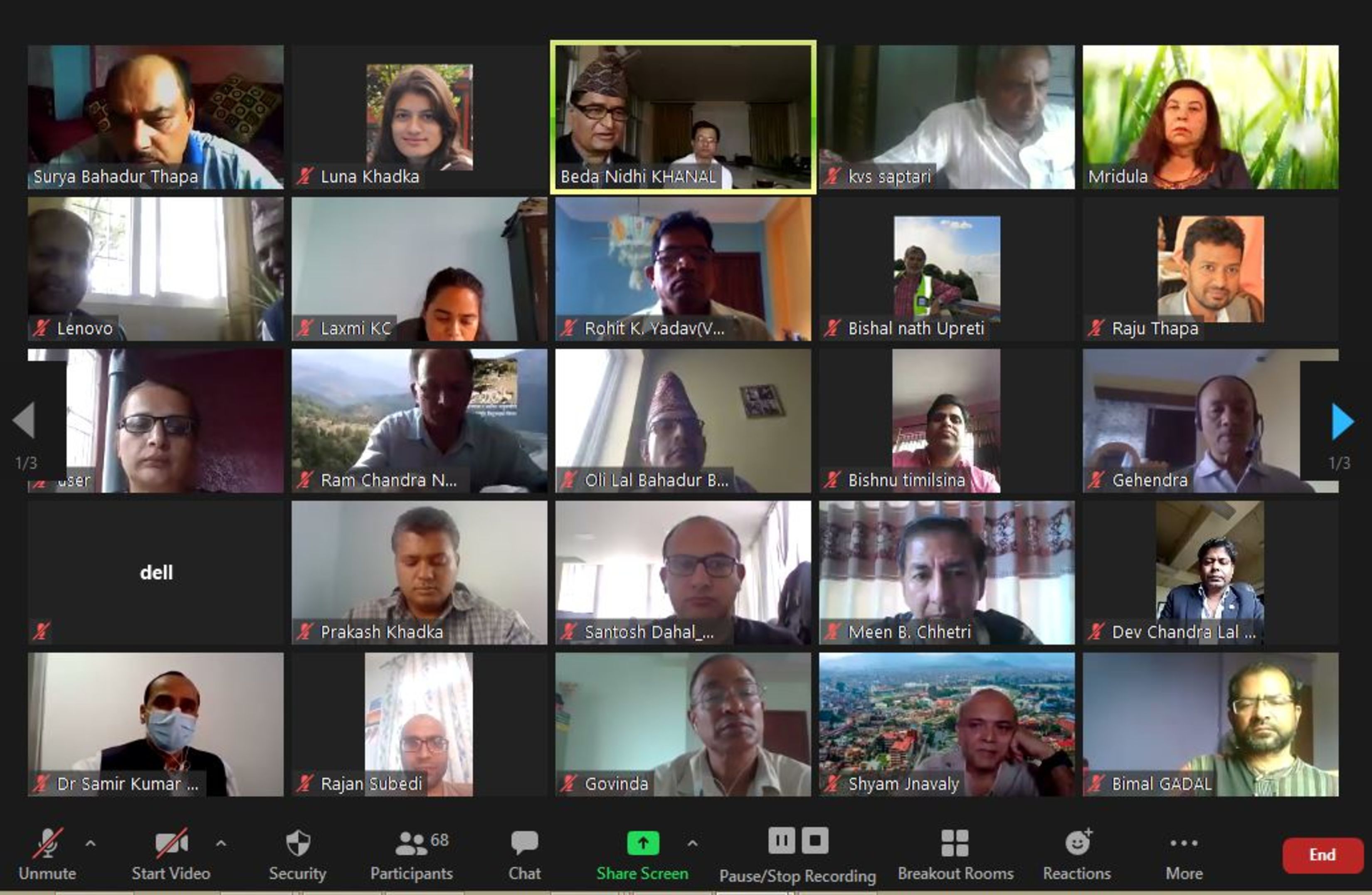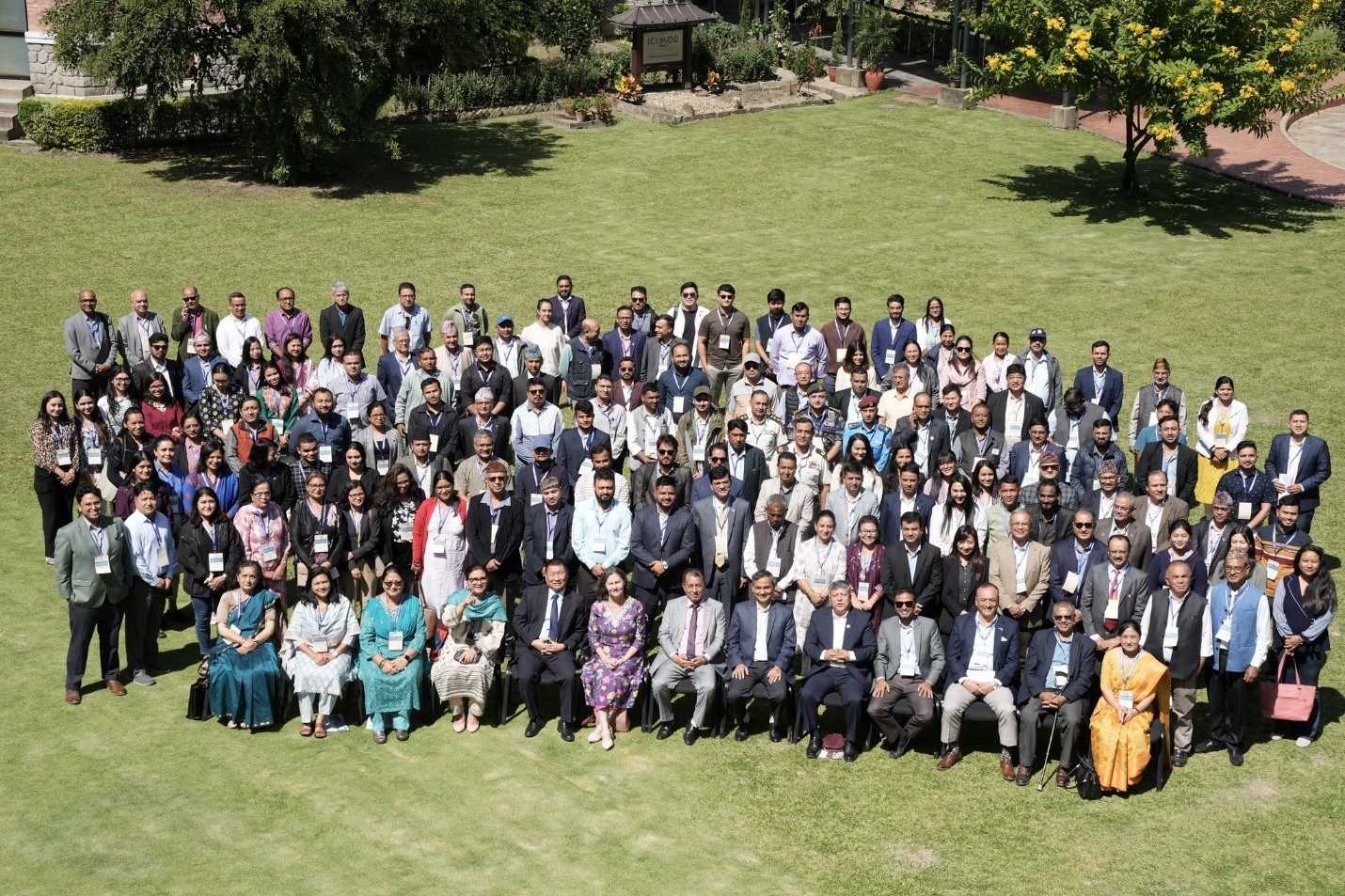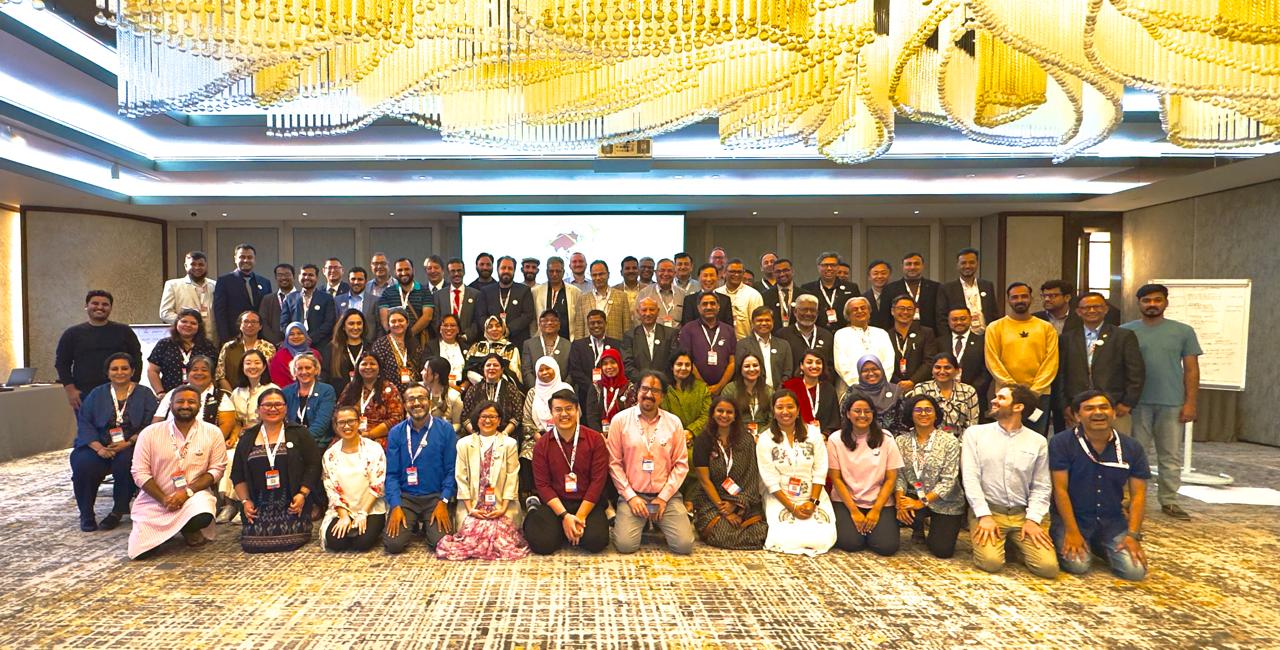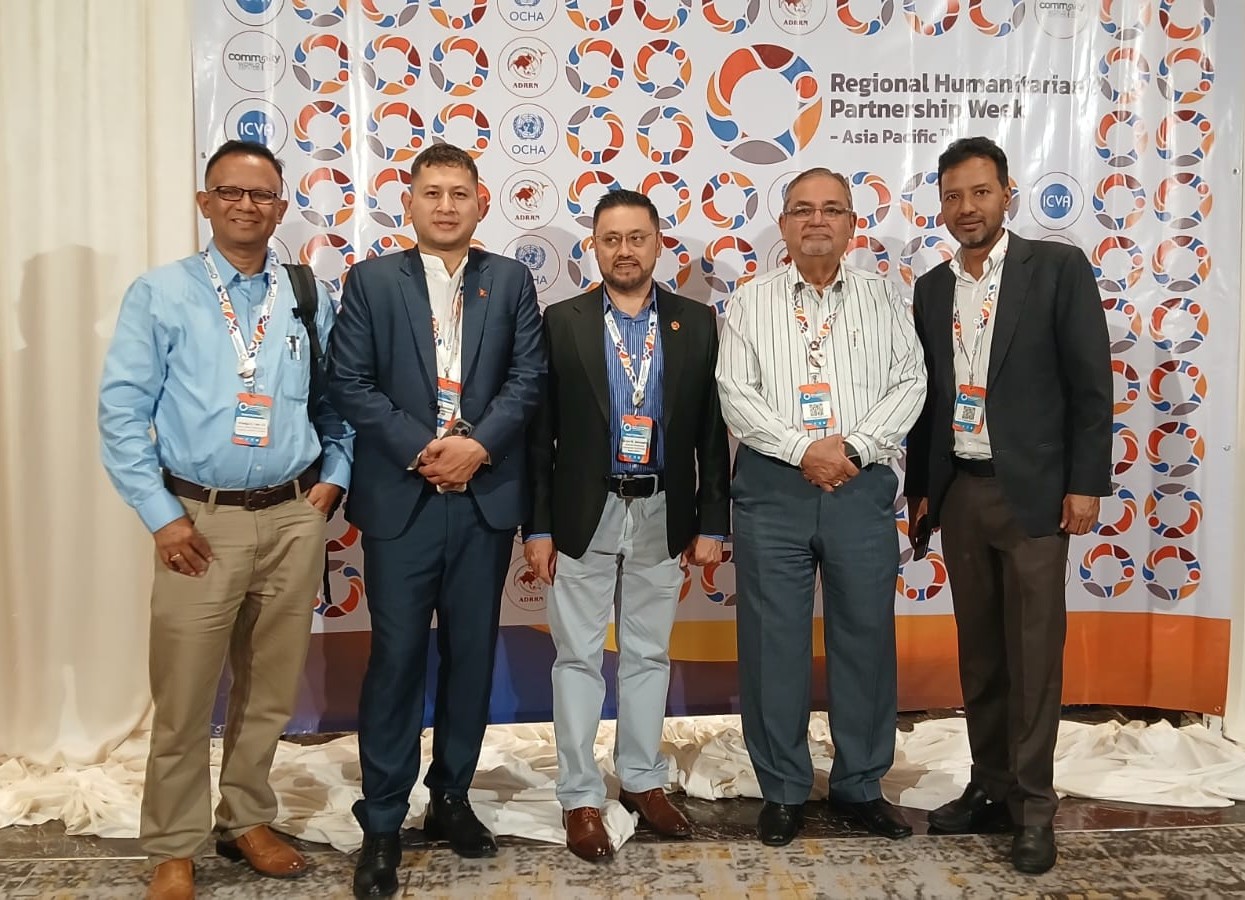Meeting of National Platform for Disaster Risk Reduction

Meeting of National Platform for Disaster Risk Reduction
15 July 2020
Background
National Platform for Disaster Risk Reduction (NPDRR) is a common platform of organizations working on Disaster Risk Reduction and Management (DRRM) to develop a common understanding of the issues of DRRM and to collectively attain the strategic priorities of the country in making Nepal resilient to disaster risk. The platform was formed in 2065 B.S (2009 AD) under the chairmanship of Secretary, Ministry of Home Affairs (MOHA) with reference to the guideline of Secretariat of the United Nations Office for Disaster Risk Reduction (UNDRR). A consultative workshop on NPDRR held on 24 October 2013 decided to provide the role of secretariat of NPDRR to DPNet-Nepal. As per this decision, as a secretariat, DPNet-Nepal has been coordinating, networking and collaboration with GOs, I/NGOS, donor agencies, UN agencies, private sectors, academia, media, and disaster-affected people. Subsequent meeting held on the Chairmanship of MoHA Secretary on 26 December 2019 handed over the leadership to the newly appointed Chief Executive of National Disaster Risk Reduction and Management Authority (NDRRMA). NPDRR regularly organizes discussion program accommodating various stakeholders working on DRRM.
A national-level meeting was held on 15 July 2020 virtually to discuss the agenda including the progress and future plan of the NPDRR, 2020 monsoon preparedness and response including disaster risk reduction initiatives and to share the recent decisions of DRRM National Council and Executive Committee. Eighty-one representatives from various sectors including Government agencies, national security agencies, I/NGOs, UN agencies, donor agencies, private sector, media and academia participated.
Proceeding of the meeting
The program started with the chairing of meeting by Chief Executive `of NDRRMA Mr. Anil Pokhrel. Mr. Surya Bahadur Thapa, Chairperson of DPNet-Nepal presented the background and objectives of the event. He also welcomed all participants. After the chairing session, the program was followed by presentations and discussions.
Presentation
 Mr. Raju Thapa, General Secretary of DPNet-Nepal presented Updates on Activities and Proposed Plan of NPDRR for the fiscal year 2077-2078. He presented a brief history of NPDRR, key activities NPDRR Secretariat under the leadership of Executive Chief of NDRRMA (since December 2019), and proposed work plan for fiscal year 2077/78. Key activities include the formation of Provincial Platforms for DRR and expanding it to the local levels, organizing National Level Conference on DRR, conduct relevant and important learning sharing program, lesson learned and good practices especially focusing on the local level, upgrade DRR stakeholders' database for prompt and effective coordination and communication, coordinate celebrations of various 'Disaster Event Days' including IDDR, assist NDRRMA, MoHA to coordinate relevant agencies.
Mr. Raju Thapa, General Secretary of DPNet-Nepal presented Updates on Activities and Proposed Plan of NPDRR for the fiscal year 2077-2078. He presented a brief history of NPDRR, key activities NPDRR Secretariat under the leadership of Executive Chief of NDRRMA (since December 2019), and proposed work plan for fiscal year 2077/78. Key activities include the formation of Provincial Platforms for DRR and expanding it to the local levels, organizing National Level Conference on DRR, conduct relevant and important learning sharing program, lesson learned and good practices especially focusing on the local level, upgrade DRR stakeholders' database for prompt and effective coordination and communication, coordinate celebrations of various 'Disaster Event Days' including IDDR, assist NDRRMA, MoHA to coordinate relevant agencies.
Mr. Anil Pokhrel, Chief Executive of NDRRMA delivered a presentation that included major components of Monsoon Preparedness and Response Action Plan 2020, the outlook of this year’s monsoon, the possible caseload for landslides, floods and other water-related disasters including actions of government agencies, non-government (UN Agencies, development partners, I/NGOs, media) and the private sector.
Based on landslide events that occurred during the first thirty days of monsoon, he highlighted how this year has experienced an unprecedented number of landslide incidents, resulting in deaths and damages. He shared efforts of the NDRRMA in collating all available landslide risk information in Nepal in a common platform. The work includes collating findings from landslide risk assessment undertaken by the Department of Mines and Geology, Department of Irrigation and Water Resources, Rastrapati Chure Tarai Madhesh Conservation Samitee, NAST, Tribhuvan University along with the works led by National Reconstruction Authority (with Support of Durham University) in the fourteen earthquake-affected districts. He also shared highlights on the change of landslide risk in the 14 districts from 2014 to 2019, including details of one representative municipal government that showed a high, medium, and low risk of a landslide at the household and sector level. Further, he also shared monsoon flood risk information and maps of high-risk districts, examples of major floods, detailed inundation map in select districts bordering with India, efforts, and initiatives taken for impact-based early warning system. He also said the collaborative effort is required to reduce the risk of flood and landslide. The presentation also included information on COVID-19 in relation to monsoon disaster, the trend of landslides, flood, and lightening in the last decade.
Mr. Pokhrel highlighted the decision made by the recent executive committee on the need for collective actions from (i) all levels of government and security agencies, (ii) UN Agencies, development partners, I/NGOs and (iii) the private sector to respond to the monsoon disasters and in providing support at the local level, DDMC and the Provincial Governments for rehabilitation.
Another area that needs immediate joint work is in the preparation of the annual report. Mr. Pokhrel suggested undertaking a mapping of organizational support for all LDMC, DDMCs, and Provincial Governments. As per the provision of the DRRM Act, 2017, The LDMC needs to submit its annual detailed progress report to DDMC and Provincial Disaster Management Executive Committee. The DDMC needs to submit its annual detailed progress report to the Provincial Disaster Management Executive Committee (PDMEC) and PDMEC needs to submit its annual detailed progress report to the Council through the NDRRMA. In order to speed up this process, it is requested all NPDRR members to provide support. Thirdly, he requested all members of the NPDRR to populate the project management information system, the development of which is nearing final stages, and that it will be shared during the next NPDRR meeting. He also shared the need for a series of dialogues for knowledge management and further said that the NDRRMA has allocated space for NPDRR in its office.
Questions and discussions
Various concerns were raised by the participants in the meeting. The major concerns are as below:
- NPDRR can work on facilitating the post-disaster recovery planning in consultation with wider stakeholders
- NDRRMA can take ownership and NPDRR can facilitate the capacity building of local and Provincial Governments.
- NPDRR also needs to facilitate talks for trans-boundary issues.
- NPDRR is an authentic platform to provide moral and intellectual support to NDRRMA, so NPDRR planned well to accommodate wider stakeholders.
- How to include GESI issues in the preparedness and response part?
- How to engage cluster and actively include LDMC in preparedness and response.
- Celebration of various days including IDDR and humanitarian day
- We are more focused on responding to approaching disaster and development works are also ongoing simultaneously, so it’s better to think on risk-sensitive land use approach
- What is the coordination between DDMC and NDRRMA? Would be better if NDRRMA could work on field rather than focusing more on maps and situation reports.
- The group of various stakeholders of NPDRR should be formed soon, disaster mainstreaming and integration is a gap in development works. So, NPDRR can provide technical support regarding the disaster mainstreaming and integration
- The early warning message by DHM should be taken in a very instrumental way. Daily early warning bulletin, specific to province and river basin has to be prepared in a wider scale.
- Human resource mapping is important, especially about the search and rescue, IRA team. So the human resource roster should be prepared in a way with experience in preparedness and response. NPDRR can work on it.
- NPDRR should basically look after the overall concerns of stakeholders, like what could be the role of academia, private sectors, and how their role can be utilized. The role of the private sector should be recognized and the role of the private sector in DRRM should be empowered.
Key Response
- Trans-boundary issues need to be addressed through a diplomatic way for long term solutions coordinating with concerned ministries. Additional prepositioning has to be done for high-risk locations.
- GESI part has been included in the action plan, lets review how can we revise for effective implementation.
- We will plan to mark the various international day. We will prepare a national disaster calendar and work accordingly.
- NDRRMA’s focus lies on reducing risk and integrating DRRM in key development sectors, let's participate and initiate such actions.
- Soon there will be revised national relief standards.
- IEC materials are disseminated in different local languages. We are moving ahead on an impact-based early warning system that uses a common alerting protocol. Guidelines for which are being prepared.
- Risk information is a major gap. NDRRMA’s annual work plan includes work on risk information.
- Discussion and sharing programs can be organized in each subgroups of NPDRR about their action plan and role.
- As decided by the recent executive committee, the 2020 monsoon preparedness and response plan along with the response plan for Susta serves as a framework for preparing similar plans at the provincial, district, and local levels. Let us work collectively in supporting the local governments for the preparation and effective implementation of such plans.
Key Decisions
- NPDRR guideline will be finalized soon and various groups of relevant agencies will be formed as per the guideline.
- NPDRR platforms will be formed at all provincial levels and expanded to the local level.
- NPDRR will organize various programs on contextual issues periodically.
- NPDRR plan of action for the fiscal year 2077/78 will be finalized upon reviewing the suggestion of various groups of agencies listed in the guideline.
- As NPDRR is a common platform for all, it is requested all participants and relevant agencies to come up with the innovative idea to work collectively to make Nepal resilient from disaster events.
- Work on mapping and identifying support from NPDRR members to support local governments, DDMCs, and provincial governments in the preparation of the annual report.
- Work on mapping identifying organizational support in the preparation of annual reports for local governments, DDMCs and the Provincial Disaster Management Executive Committee.
- NDRRMA will provide a ‘NPDRR desk’ in its office.
Closing
Mr. Anil Pokhrel thanked all for participating in the NPDRR meeting despite the COVID-19 and monsoon disaster crisis and requested for collective actions and effective implementation of the Monsoon Disaster Preparedness and Response Plan 2020.
Mr. Surya Bahadur Thapa requested sharing the suggestions for NPDRR guideline through email and thanked all participants for their active participation and closed the meeting on behalf of Mr. Anil Pokhrel.











